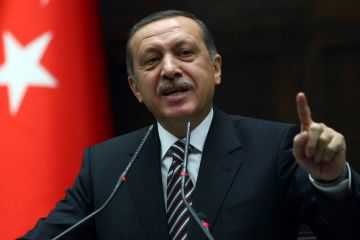Fed up with former ally, Turkey attempts to isolate Syria’s president, Bashar al-Assad.

GAZIANTEP, Turkey — In this border town, not far from Aleppo, Syria’s economic hub, a busy Syrian consulate had been a symbol of the strong political and economic ties the two countries had shared for more than a decade.
But these days, a note now posted to its door is perhaps a better description of the Syrian-Turkish relationship: “The Gaziantap Syrian Arab Republic Consulate is closed until further notice.”
The closing of the consulate is just the latest in a series of events that has brought these two neighbors — which although have had a rocky history, have enjoyed close ties in recent years — worryingly close to conflict.
More from GlobalPost: Who is the Free Syrian Army?
Turkish-Syrian relations reached a new low after Turkey imposed sanctions on its once close ally last week.
Turkey has been one of the most vocal critics of a violent crackdown against protesters by Syrian President Bashar al-Assad’s security forces. The Turkish government has been diplomatically hammering the Assad government since the uprising began in earnest earlier this year, warning Assad to find a peaceful solution as early as August.
The economic sanctions, however, were the first concrete step Ankara has taken against Syrian, and now Damascus is firing back. The Syrian government, in retaliation, suspended a free trade agreement that had existed between the two countries since 2007.
The nine point list of sanctions aims to force the Assad regime’s hand financially. The sanctions include a a travel ban and the freezing of financial assets belonging to ket members of the Syrian government. Turkey also halted all transactions it conducts with the Syrian Central Bank and the Commercial Bank of Syria.
Under the sanctions, Turkish authorities said the country would prohibit the transport of all military equipment and weapons into Syria via Turkish territories. Turkey will also stop credit payments to Syria and will suspend a large loan that had been intended for infrastructure projects inside.
“In our opinion, by wasting all the opportunities offered to them, including the final opportunity of the Arab League, the Syrian administration has come to the end of the road,” said The Syrian Administration set the stage for this on its own,” said Turkish Foreign Minister Ahmet Davutoglu in a statement.
The sanctions last week came at the heels of an Arab League decision to implement its own sanctions on Syria and marked a dramatic change in strategy on behalf of Turkey, which had previously tried to convince its former ally to begin a reform process.
In August, Davutoglu traveled to Syria to deliver a message urging Assad to stop all military operations against its people. But despite the efforts, Assad has repeatedly rejected Turkey’s call for reform and recently rebuked an offer from the Arab League to send observers into Syria to assess the situation.
Meanwhile, the United Nations said that more than 4,000 people have likely been killed during clashes in Syria since demonstrations began in mid-March. Avaaz, an international human rights organization, said the number could be even higher.
“The economic sanctions will effect the businessmen in Syria who support Assad. It is a good step, it will effect the regime but it will not topple Assad,” said Halit Khodja, a member of the Syrian National Council, a broad-based opposition group outside Syria.
Khodja said that the opposition also hopes that Turkey and other countries in the region would institute a no-fly zone and other protections that would hinder the Syrian military.
“The next step needs to be a buffer zone and a no fly zone,” Khodja said. “But just pushing Turkey to the front lines would not be successful without international support,” he said.
Ankara has made clear that they will not pursue a no-fly zone or any other military actions without support from NATO or the United Nations.
Turkish criticism of the Assad regime has been building since more than 10,000 Syrian refugees, fleeing a military crackdown on protests in Jisr al Shugur, a city near the border, crossed into Turkey in June.
The Turkish government responded by establishing camps in the border town of Hatay. More than 7,000 refugees still remain in those camps and many more, who are staying with family or friends, are scattered throughout Turkey.
Although most of the refugees living in Hatay are civilians, some are members of the Free Syrian Army, a small group of military defectors who have begun to organize a small, but growing, armed rebellion. Last month, the group launched an unprecedented attack on a Syrian Air Force Intelligence base that is a symbol of the regime’s most-feared branch of security.
A defining moment in the breakdown in relations between the Turkey and Syria came in November when pro-Assad demonstrators attacked Turkish diplomatic missions in three Syrian cities. The supporters burned a Turkish flag and posters of Mustafa Kemal Ataturk, the founder of modern Turkey.
“Bashar Assad should see the tragic end that meets leaders who declare war on their people,” Turkish Prime Minister Recep Tayyip Erdogan said after the attacks. “Oppression does not create order and a future cannot be built on the blood of the innocent. History will remember such leaders as those who fed on blood. And you Assad are headed toward opening such a page.”

Leave a Reply